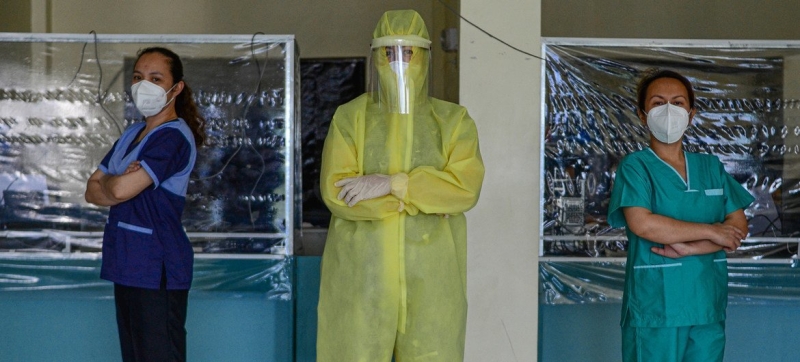- Puppet show enchants Children as Boi Mela comes alive on day 2 |
- DSCC Admin Salam’s drive to make South Dhaka a ‘clean city’ |
- 274 Taliban Dead, 55 Pakistan Troops Killed |
- Now 'open war' with Afghanistan after latest strikes |
- Dhaka's air quality fourth worst in world on Friday morning |
WHO Assembly Adopts Landmark Global Health Measures

In this 2020 photo, a doctor in full protective gear stands with volunteer nurses caring for COVID-19 patients at a community hospital in the Philippines. UN Women/Louie Pacardo
The 78th World Health Assembly concluded in Geneva on Tuesday, delivering several milestone decisions on global health, from pandemic preparedness to pollution reduction and equity in care.
During the nine-day meeting, delegates adopted the first-ever WHO pandemic agreement, approved a significant budget increase, and passed a series of resolutions targeting urgent health challenges.
“The words ‘historic’ and ‘landmark’ are overused, but they are perfectly apt to describe this year’s World Health Assembly,” said WHO Director-General Dr Tedros Adhanom Ghebreyesus at the closing ceremony.
At the heart of this year’s Assembly was the WHO Pandemic Agreement, adopted on 20 May following more than three years of negotiation. Designed to improve global readiness and response to future pandemics, the agreement promotes international cooperation, equitable access to medical tools, and stronger crisis preparedness.
Next steps will focus on access to pathogens and benefit-sharing, ensuring fair distribution of treatments and vaccines developed from them.
Member States also approved a 20% increase in assessed contributions – the core, mandatory funds WHO receives from countries – marking a key move toward the agency’s financial sustainability. By the 2030–2031 period, these contributions are expected to cover half of WHO’s core budget.
Additionally, countries pledged at least $210 million in WHO’s ongoing Investment Round, adding to the $1.7 billion already raised and expanding its donor base.
The Assembly endorsed a wide range of resolutions aimed at promoting health equity, environmental protection, and noncommunicable disease control: First global resolutions on lung and kidney health, a goal to halve health impacts of air pollution by 2040, new focus on social connection as a health priority, measures to limit digital marketing of infant formula and initiatives addressing rare diseases and Guinea worm eradication
Wrapping up the Assembly, Dr Tedros urged nations to carry the spirit of cooperation forward:
“You, the nations of the world, made history. Yes, there is conflict, but you have shown cooperation. Yes, there is inequity, but you’ve shown a commitment to equity. Yes, there is disease, but you’ve shown a commitment to health – health for all.”

